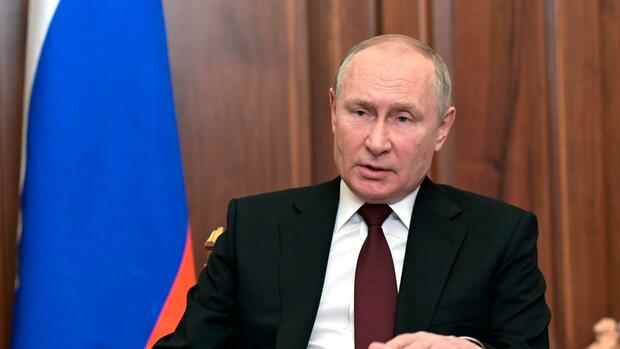The lobby association has canceled a video call with Russia’s president planned for early March by the Committee on Eastern European Economic Relations.
(Photo: AP)
Dusseldorf, Berlin After the escalation in the Russia-Ukraine conflict, top German managers will not meet with Vladimir Putin. The lobby association canceled a video call planned for the beginning of March by the Eastern Committee of German Business, according to the response to the Handelsblatt’s request “due to deadlines”.
Once a year, the Committee on Eastern European Economic Relations organizes a business meeting with Russia’s president to address issues of economic relations. In 2021 the meeting was canceled due to the pandemic, now because of the conflict situation.
The association condemned the Kremlin’s actions: “On behalf of the German economy, we urge Russia to return to the negotiating table.” it.
This also applies to cooperation with Ukraine. According to the German-Ukrainian Chamber of Industry and Commerce, around 2,000 companies with German participation are active there. Above all, medium-sized automotive suppliers such as Leoni from Nuremberg or Prettl from near Stuttgart are represented there. Both did not want to comment on the developments when asked by the Handelsblatt.
Top jobs of the day
Find the best jobs now and
be notified by email.
According to Alexander Markus, Managing Director of the Chamber, the recent escalation will initially have no impact on the work of German companies in Ukraine. Since the end of economic relations with the Donetsk and Luhansk regions in the east of the country, some of which are not controlled by Ukraine, in 2017, no company with German participation has had any more locations there. Most of the companies are traditionally based in the west of the country – more than 700 kilometers away from the Russian troops.
Metro strong in Ukraine
The Lower Franconian gypsum manufacturer Knauf operates its largest Ukrainian plant in the Donbass region and thus in the vicinity of the conflict line, but not in the separatist areas occupied by Russia. The family business was “prepared for all eventualities,” it said last week. On Tuesday, the company did not want to comment again on request.
The reluctance to comment on political events is likely to be subject to business interests. For the wholesale group Metro, for example, Russia is the third largest foreign market. The company operates 93 stores there, with a turnover of 2.4 billion euros. What makes the situation for the Düsseldorf-based company tricky: It also has 26 stores in the Ukraine, with which it achieves sales of 800 million euros.
>>> Also read: Olaf Scholz shows with the stop of Nord Stream 2 format
Some locations are in vulnerable areas, such as the wholesale market in Mariupol, the last major Ukrainian-controlled city in the embattled east. The wholesaler is therefore observing the current development with concern: “We continue to rely heavily on diplomatic efforts from all sides to avert further escalation,” said a spokesman. Metro CEO Steffen Greubel had promised to take part in the video conference with Putin a long time ago.
Like Metro, all German companies are initially continuing their business in Ukraine. “I have not heard from a single German company in Ukraine that they want to leave the country because of the escalation,” explained Markus, head of the Chamber of Commerce. The Ukraine attracts with affordable skilled workers, and the country with more than 40 million inhabitants also offers a relevant sales market.
According to the Federal Statistical Office, Germany and the Ukraine make a good seven billion euros from exports and imports. Business with Russia is almost 45 billion euros.
More: Why German companies are investing in Ukraine despite fear of war
